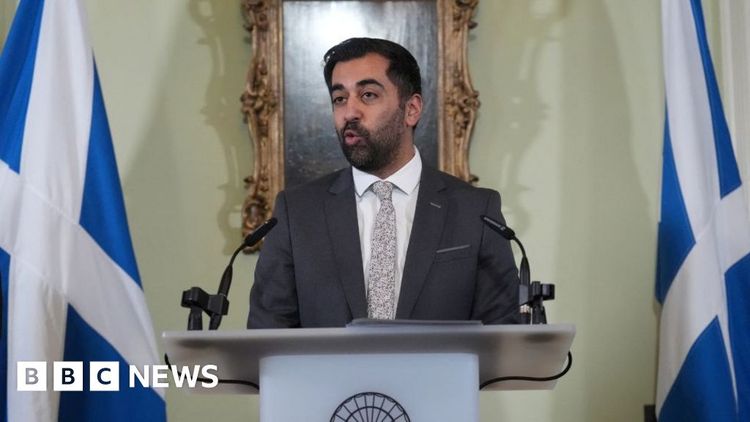What happens now after Humza Yousaf's resignation?

Who might take over the SNP after Humza Yousaf stepped down?
The race is on to determine who will take on the mantle of Scotland's seventh first minister, following the announcement of Humza Yousaf's resignation.
The SNP leader facing challenges from two no-confidence motions in the Scottish Parliament announced his choice in a statement at Bute House.
After the breakdown of a deal to share power with the Scottish Greens, this situation occurred.
Mr. Yousaf stated that he plans to retain his position as the first minister until a new leader of the Scottish National Party is selected. This is consistent with the course of action taken when his predecessor, Nicola Sturgeon, resigned last year.
SNP's New Leader Selection Process
People predict that the procedure will resemble the course of action taken when Ms. Sturgeon resigned.
Applicants were obligated to secure one hundred endorsements from a minimum of twenty community party divisions.
If multiple candidates qualify through the examination, then a competition for leadership will ensue.
The champion is elected through a ballot among members employing a system known as single transferable vote. The previous edition of the competition was finished in about a month, culminating in Mr. Yousaf being officially nominated to serve as the first minister by the parliament.
Afterwards, the upcoming leader of the SNP will have to gain the approval of the parliament to take over from Mr Yousaf as the first minister.
Choosing A New First Minister: How It Works
After the King accepts Mr. Yousaf's resignation, the parliament will have a total of 28 days to name a new person to fill his position.
Since Mr. Yousaf has opted to remain as the first minister until the selection of a new party leader is made by the SNP, the timer will not begin until the successor is named.
Assuming that there is just an individual running for parliamentary designation, they would only require majority support to successfully clinch the nomination.
It is also possible for leaders of different political parties to present themselves for nomination. In the event that this happens, and it did happen when Mr. Yousaf became the first minister last year, the nominee who receives over 50% of all votes will be declared the winner.
If nobody met the mark, the participant with the least number of votes would be removed. This action would be repeated until only two remained in the running.
At this juncture, if a candidate manages to secure a simple majority, they will clinch the nomination by outpacing their opponent in terms of votes.
Any Managed Service Provider (MSP) has the authority to suggest a nominee, but it needs a second from a different member. The parties that disagree typically have their own leaders who they put forward as candidates for the first minister position just as an alternative. However, they do not have high expectations of their person winning.
Once the vote is decided, the individual who is selected will be officially designated by the monarch.
If the parliament is unable to come to an agreement on who should be the first minister within the span of 28 days, then the presiding officer must suggest a date for a special election.
Is A Government-wide Resignation Possible?
Mr Yousaf had been confronted with two votes of no confidence this week. One was proposed by the Scottish Conservatives targeting his position as the first minister, while the other came from Scottish Labour and was aimed at the government as a whole.
It is uncertain when parliament will confirm the voting schedule and whether Mr. Yousaf's announcement will result in the removal of either option.
Douglas Ross, the leader of the Scottish Conservative Party, expressed his opinion to BBC News that Mr. Yousaf should have resigned immediately. He also noted that his party's motion of no confidence is still an option.
Anas Sarwar, the leader of the Scottish Labour party, stated that he will monitor the situation and observe how the week unfolds. Nevertheless, he affirmed that his party’s no confidence motion in the government's "basic idea" remains unchanged.
If it gets approved, the government officials will have to resign. It only requires more votes in favor than against, which is known as a simple majority.
After the election of a new government to represent the people, the members of Parliament would have 28 days to select someone to take on the role of first minister. If they were unable to reach a decision within this time frame, then the parliament would be disbanded and a new election would need to be held.
The political party known as SNP currently holds 63 Members of the Scottish Parliament (MSPs). This implies that if all MSPs belonging to other parties vote against the SNP, they might be beaten.
According to BBC News, it is understood that the Green Party, which holds a total of seven seats, will not back either of the no-confidence votes after Mr. Yousaf's declaration.
Patrick Harvie, who leads the Green party, stated that the Scottish Greens have a history of working cooperatively while in opposition. He added that they are willing to work alongside any first minister who shares their progressive values and can earn their trust.









































